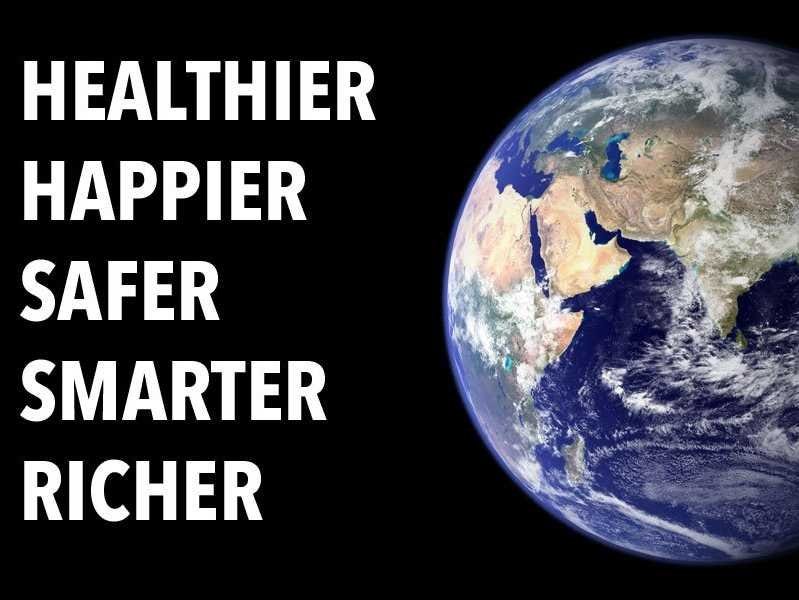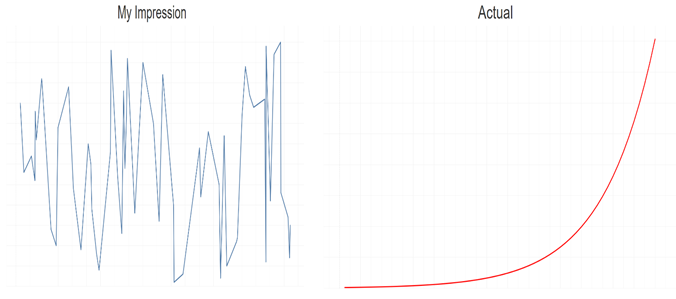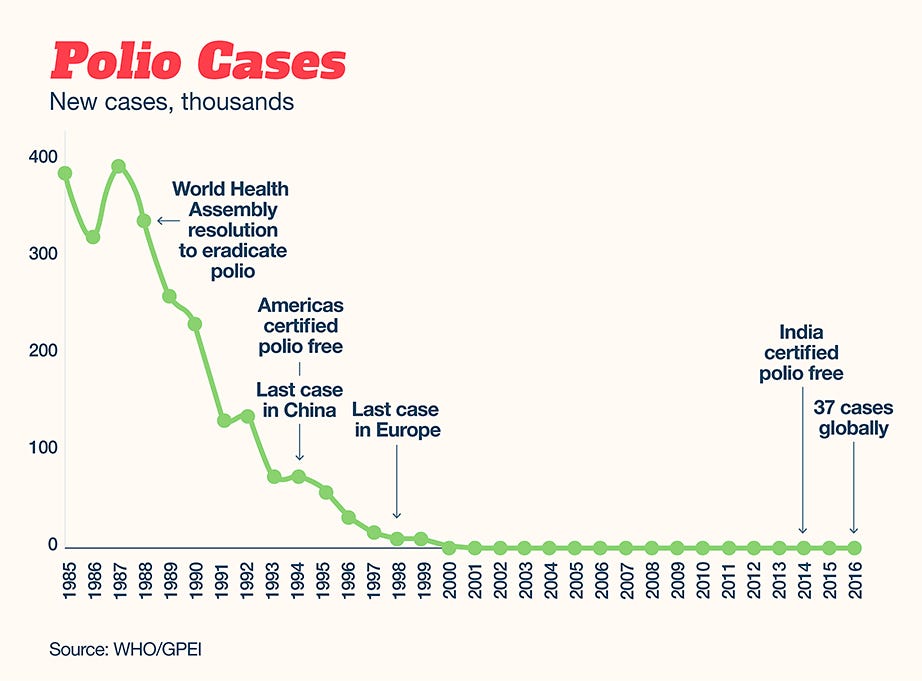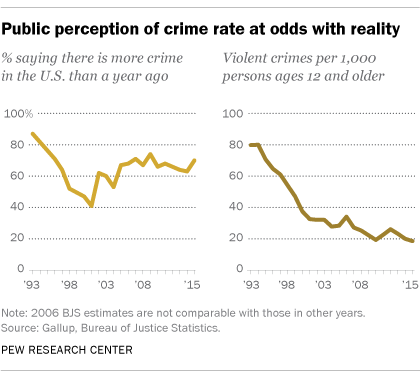The Vanquishing Of War Plague And Famine

Part 1 of the Optimist’s Guide to the 21st Century
The next time you sit down to dinner, start off the conversation with the statement: “The world today is more peaceful, more prosperous, and healthier than at any point in human civilization.” Wait a few seconds for it to sink in, and then ride out the inevitable storm of protestations, most of which will begin with: “Well today on the news I heard…” or “I saw a picture in the paper the other day…” While the commotion roils, take solace in the knowledge that your statement is entirely correct. Once the uproar has subsided, pull out this article, and slowly begin to turn everyone’s world upside down. Indeed, any way you look at it, humans today are better off than at any other point in history.
This is the first in an indeterminate number (I’ll put the bounds at one and infinity) of articles about the drastic improvement in the human condition throughout history. It is designed to get past the surface-level stories of constant strife we hear reported in the press and take a fact-based look at the current and historical state of human affairs. When two years ago, I began reading deeper into the large scale trends surrounding humanity, I expected to find a roller-coaster graph of human living conditions over time with large drops and rises, and the modern world in a particularly deep trough. What I discovered instead is that the story has been a gradual increase with a dramatic acceleration in the latter half of the 20th century (what is called exponential growth).
 Human Condition Over Time
Human Condition Over Time
These startling realities led to a change in my worldview and I gradually adopted a positive outlook for the future of humanity (I like to say I’m a short-term realist but a long-term optimist). My intention is not convert anyone with this series, but rather to encourage readers to take a deeper look at the state of our world beyond the headlines.
Grand Scale Improvements
Let’s start our examination on the grand scale of all of human history. As Yuval Harari writes in his non-fiction work Homo Deus: A Brief History of Tomorrow, for the entirety of human existence up until the last few decades, humans were occupied on a daily basis with the “Big Three” problems of famine, plague, and war. Yet, in the 21st century, we can look back and realize that we have, for the most part, vanquished all three of these issues. As Harari summarizes, “For the first time in history, more people die today from eating too much than from eating too little; more people die from old age than from infectious diseases; and more people commit suicide than are killed by soldiers, terrorists and criminals combined.” The average human today is far more likely to die from the problems of overabundance than from a wheat shortage, ISIS attack, or Ebola outbreak. However, bold claims such as these are meaningless by themselves. In order to give these statements value, it is time to take a journey through the numbers that demonstrate the extent to which we have solved our largest historical challenges.
A nice dinner-table worthy opening point is plagues, the invisible killer that has decimated human populations again and again. (In this case, decimate is not a strong enough word as it comes from the Roman military practice of killing one of every ten soldiers as a form of discipline). Diseases spread by Europeans to the New World starting in the 1500s routinely killed up to 90% of the native inhabitants, notably in the Aztecs and Mayans in central America. As an example, the native population in Hawaii decreased from half a million to 70,000 individuals within 80 years of James Cook first setting foot in the islands. Native peoples had no biological defenses against diseases they could not see let alone comprehend. Humanity in the 21st century however, is no longer helpless in the face of pathogens. Modern medicine has allowed us to prevent numerous diseases, significantly mitigate the effects of the diseases that we do catch, and wipe some plagues off the face of the Earth. Smallpox, the disease that more than any other factor may have been responsible for the Spanish conquest of Central America, was eradicated by humanity in 1979 thanks to a monumental global vaccination campaign overseen by the World Health Organization. Measles and Polio are next on the way out. In 1988, when the campaign to eradicate polio was launched, there were 350,000 new cases per year. In 2016, there were 37. It is possible that in 2017, the world will see its last ever case of polio.
 Worldwide Polio Cases
Worldwide Polio Cases
The reduction in global infectious disease deaths has occurred even as the world has become more connected , seemingly predisposing us to more disease outbreaks. Nonetheless, the outbreaks that do occur today are on a much smaller scale and cause far less damage than any historical plagues. Take the Ebola outbreak that lasted for 18 months in 2014–2016 and was accompanied by hysterical cries of doom and calls to shut down international travel. The entire Ebola outbreak infected only 30,000 individuals (4 in the United States) and only 11,000 individuals perished. This is 1/3 of number of people killed in the United States in automobile accidents every year. The global response to the outbreak was incredibly effective, and in December 2016, a vaccine was released with 100% efficacy. This transformation of what once would have been a catastrophic event for entire human civilizations into a minor regional flare-up is a testament to the amazing capabilities of modern medicine and to the rapid international response enabled by collaboration between government agencies and non-governmental organizations (NGOs). As we move forward in the 21st century, we must remain vigilant about the possibility of plagues, but we can take solace that we are no longer helpless in the face of disease.
The second scourge in the triumvirate of human problems is famine. The default state of nearly all human societies up until the last decades of the 20th century was food vulnerability. One bad season or poor planting decision could lead to the starvation of millions of individuals. Historically, famines killed significant percentages of even well-established agricultural societies. For example, from 1692–194 in France, nearly 15% of citizens perished in a famine that resulted from two years of uncooperative weather. The same conditions killed one-fifth of all individuals in 1695 in Estonia. Famines have repeatedly struck every type of society with devastating results, particularly for the poorest individuals. However, in the last 50 years, a global network of government agencies, NGOs, and private insurance agencies have constructed a robust food security network that has made it exceedingly unlikely that famines will effect large swaths of a population. A poor harvest, or even multiple seasons of unfavorable growing conditions no longer spell doom for a society. In fact, the greater problem in the modern world is one of overabundance. While starvation/malnutrition led to the deaths of slightly under 1 million individuals in 2010, obesity related diseases killed over 3 million people. The “green revolution” and the miracle of modern agriculture (including Genetically Modified Organisms which have allowed us to feed more people cheaper than ever before with less environmental impact) have allowed humanity to move away from the default state of food insecurity. Today, we live in a world where just 2% of the population is able to feed the other 98% and farming now produces 2.5 times the amount of food as in 1950 with fewer inputs. In fact, collectively, the world produces enough food to feed everyone on the planet and the issue remains only in the distribution of nutrition. As with plagues, we have not eradicated hunger completely, but there are numerous plans in action that will soon allow us to cross famine off humanity’s collective to-do list.
Finally, we must address what is sure to be the most controversial point of this article: humanity has reduced the extent and impact of violent conflict to a new low. This may be nearly impossible to fathom in our seemingly conflict-obsessed society, but a careful examination of history proves that this is the case. Throughout all of human history, the accepted state between different groups of humans has been conflict. Yuval Harari describes this as the “Law of the Jungle”: even if two groups were temporarily at peace, war was always an acceptable option for resolving conflicts. Times of peace were viewed as temporary interludes between conflicts. Now however, the narrative has flipped and the 21st century is on track to be the most peaceful century in human existence. Moreover, the 20th century, even with 2 global conflicts and numerous regional conflicts, was the most peaceful century in all of history. That point bears repeating: The 20th century was the most peaceful century in human existence. As Steven Pinker details in his book The Better Angels of Our Nature: Why Violence Has Declined, war killed at least 15% of the population in antiquity, 5% of the population in the 20th century, and less than 1% of the population since the turn of the millennium. On every conceivable scale, from human civilizations to individuals, from millennium down to single years, violence is on the decline. The global death rate from violence has fallen from 500 per 100,000 individuals in prestate societies to less than 1 in developed nations. Homicide rates in most parts of the developed world have fallen by 100 times in the past six centuries. The image of peaceful native peoples in ancient times and brutish, ruthless modern humans is flipped. Since 2002, the proportion of youth involved in violent behavior has fallen by 29% according to a study from the American Journal of Public Health. Even the threat of terrorism is miniscule; terrorists from the seven nations included in the administration’s recent travel ban killed 0 Americans from 1975–2015. For Americans, fast-food restaurants pose a much greater danger to your health than al-Qaeda. As Harari bluntly puts it: “Sugar is now more dangerous than gunpowder.” Countries no longer turn to violence as the first method for solving problems, and democratic countries nearly never go to war with each other. Increasingly, the global economy has come to rely on trade between nations, and this connectedness means it does not make sense to invade your neighbor when they are the ones feeding your citizens. Posturing between some of the most powerful nations on Earth may at the moment seem frightening, but it is nothing more than bluffing. Countries and leaders have matured to the point (well with one notable exception) where resolutions are worked out in boardrooms with lawyers armed with expensive pens and large vocabularies rather than soldiers with well-honed swords.
The massive improvements that humanity has collectively made, particularly in the past 50 years, raises a critical question: If the examination of reality demonstrates that we live in a more peaceful age than ever before, why does no one believe that to be the case?
To address this query, think back to the dinner table situation I outlined at the beginning of the article. The first objection anyone will make to the claims of worldwide peace, prosperity, and health is that they have repeatedly heard the exact opposite from various sources. In our modern world, we are exposed to more news and information in a single day than our distant ancestors would have been over the course of their entire lifetime. Therefore, we should easily be able to ascertain the historical and present-day realities and come to the realization that life really is getting better for the majority of humanity. However, access to information does not mean that we are in fact better informed. (In the words of Mark Twain: “If you don’t read the newspaper, you’re uninformed. If you read the newspaper, you’re mis-informed.”) Unfortunately, bad news sells much better than good news. Humans, whether we like it or not, are evolutionarily wired to pay more attention to negative news and to adopt a pessimistic worldview. Our ancestors on the savannah who saw a lion hiding behind every rock were much more likely to survive and pass on their genes than the hominids who stopped to appreciate the beauty of nature.
In addition to the evolutionary benefits of adopting a negative outlook, stories of tragedy and woe are more intriguing to us as social creatures. There is considerably more gossip to be derived from a break-up than from a happy marriage. (How many times have you started a conversation about a postive aspect of your co-workers?). It does not take a trained psychologist to notice these human tendencies, and media companies are well-aware of our predisposition to negative information. Therefore, when we turn on the television or the radio (people still do that right?), is it any surprise that we are inundated with stories of murder, conflict, and tragedy? It is not the number of violent incidents that are on the rise, but the coverage of these events. As humans are mere reflections of their environment, it is inevitable that we will come to adopt the negative attitude encouraged by these stories. Surveys repeatedly show that Americans believe violent crime is on the rise even as the rates of crime have dropped precipitously.
 Perception vs Reality of Crime
Perception vs Reality of Crime
The negativity cycle is self-perpetrating: we are naturally inclined to pay attention to bad news, the media shows us negative news stories, and our attitudes become even more pessimistic. Over time, we adopt false belief that the world is becoming a worse place to live. Indeed, ask Americans what they think about the world, and they will say that the country is not improving. This cycle is a prime example of what is known as the representativeness bias.(This is also referred to as the representativeness heuristic where a heuristic means a rule of thumb that we adopt as a mental shortcut when we are forced to make a rapid decision). The idea is that humans judge the likelihood of an event based on how easily they can call to mind examples of the event. Therefore, when people are asked to judge the chance that they will be murdered or die in a terrorist attack, they vastly overstate the true probability because of all the attention the media gives to these extremely rare events. Violence, poverty, famine, plague, and war continue to decrease on a yearly basis while conversely, the coverage and saturation of these events grows ever more prevalent.
The other major reason for the public unwillingness to believe in the overall improvement in the human condition is that people need to believe they are engaged in a great struggle. It gives our lives meaning if we think that we are overcoming unimaginable odds to achieve success. In the modern United States, we do not do battle against war, plague, and famine on a daily basis. Instead, we are forced to create a mental image of a terrible and frightening world so we can feel like we are triumphing in the face of extreme difficulties. Humans have been in a constant struggle for survival for 99% of our existence, and now that the pressures of starvation and conflict have been lifted from our daily life, we feel lost. To compensate, we generate a fictional representative of the world in which we are still locked in a fight to make it through each day. To accept the truth that the world is actually getting better means to give up this fantasy and admit that our lives are easier than ever before. It requires that we no longer have the defining scourges of war, plague, and famine to do constant battle against. (This raises the interesting possibility that we could replace the “Big 3” with something equally worthwhile such as solving climate change, developing genetic engineering, and creating beneficial artificial intelligence). The statement “may you live in interesting times” is often presented as a curse, but I believe that many people instead see it as a blessing. People want to experience monumental events during their lifetime, even when those events are monumentally negative. In short, we believe that the world is on the decline because it gives us something to argue about at the dinner table.
How Should We Respond?
What should we do now that we are aware of this privileged information? What steps can we take in our life to make sure that the trend of general improvement in the human condition continues? The critical part is that we do not sit back and relax now that we know humanity is on the right track. All of these improvements, from the reduction in the extent of famine, to the eradication of diseases has not come about automatically. These problems have been systematically addressed through a combination of science, medicine, and evolution of society’s collective morals. The solutions have been achieved through the work of millions of individuals who took the long term view rather than trying to maximize short-term rewards. We must carry on in this tradition by focusing on our strengths (science, medicine, arts) and suppressing our weakness (pessimism, the desire for vengeance). We have to realize that our efforts, both as individuals and as nations really do make a difference. Moreover, by improving the lives and increasing the prosperity of citizens in all nations, we benefit ourselves. By eradicating and controlling disease in developing countries, we immunize ourselves against a global pandemic. By donating food to countries currently struggling with shortages, we can gain valuable trading partners far in the future. And by working to prevent violence in all countries, we stabilize the entire world and keep our citizens safe (even safer than we already are). When we view the world as one connected community, we realize that improving the life of even one individual in another country raises the standard of living for all of humanity.
One practical step you can take with this information is simply to spread it. The next time you hear a negative news story or a relative brings up a tragedy they heard, gently remind them that these stories only make it into the public consciousness because they are anomalies. Remind them that since 1990, the global extreme poverty rate has been cut in half. One billion less people live in extreme poverty today than did 25 years ago. Furthermore, the childhood mortality rate has decreased by 50% since 1990 thanks to advances in infant care, education, and access to trained medical experts. 86% of children born around the world today receive basic vaccines, the highest figure ever. The next time someone raises an objection to foreign aid, inform them that every dollar the United States invests in vaccination returns $44 in economic benefits to our economy. (Preceding facts are taken from Bill Gate’s 2017 annual letter). I could go on for pages, but I will leave that exercise for another article. Communicate to those around you that we have conquered war, famine, and plague, and are making progress on all fronts towards a more prosperous, equitable, and sustainable worldwide civilization. Talk to people, make them aware of these facts, and then work to make the statistics even better. When politicians campaign on promises of decreasing foreign aid and diverting it to the military, citing the threat of conflict, remind your neighbor that in fact, armed conflict is decreasing thanks in no small part foreign aid. Remind your friends and your family that we have less to fear than ever before and as a country need we should reflect that in our investment and priorities. And finally, stop being a cog in the fear-mongering news cycle. I took a sabbatical from the traditional news two years ago and I have not gone back since. I diverted more time to reading about what is actually going on in the world rather than what the media presented to me. Yes, I may not be able to participate in all the recent gossip or bemoan the most recent tragedy, but I can discourse at length on the polio eradication campaign and the massive improvements in global agriculture production. I will delve into the full impacts of my news-free lifestyle in a future article, but for now, I will leave you with this: I believe that switching off the news has made me a better informed citizen and more aware of both my individual biases and the collective biases of our society. I am more empathetic, less anxious about the world at large, and I have more meaningful conversations with my fellow humans once we get past the surface level stories that dominate the headlines. At the end of the day, the narrative we tell ourselves about the world we inhabit is the only thing that matters. Would you rather live in a tragedy, or in a triumphant story that reflects the reality of the 21st century?
Will